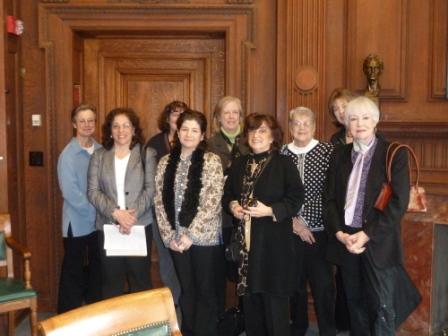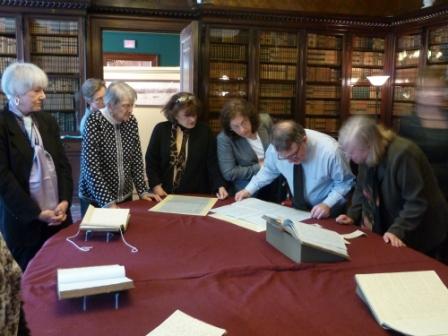By Elaine Grublin
Each year the MHS grants a number of research fellowships to scholars from around the country. For more information about the different fellowship types, click the headings below.
As you can see the fellowship program brings a wide variety of researchers working on a full range of topics. If any of the research topics are particularly interesting to you, keep an eye on our events calendar over the course of the upcoming year, as all research fellows present their research at brown-bag lunch programs as part of their commitment to the MHS.
MHS-NEH Long-Term Research Fellowships:
Joshua R. Greenberg, Associate Professor of History, Bridgewater State University, “Face to Face: American Engagement with Paper Money in the Early Republic’
Joanne Pope Melish, Associate Professor of History, University of Kentucky, “Making Black Communities: White Laborers, Black Neighbors, and the Evolution of Race and Class in the Post-Revolutionary North”
Margot Minardi, Assistant Professor of History and Humanities, Reed College, “American Citizens of the World: The Political Culture of Peace Reform, 1812-1865”
Suzanne and Caleb Loring Research Fellowship On the Civil War, Its Origins, and Consequences (with the Boston Athenaeum):
Jordan Watkins, Ph.D. Candidate in History, University of Nevada, Las Vegas, “The Place of the Past in the American Civil War”
New England Regional Fellowship Consortium (NERFC) Awards (with 16 other institutions)
Lisa Brooks, Assistant Professor of History and Literature and Folklore and Mythology, Harvard University, “Turning the Looking Glass on King Philip’s War.” Colonial Society of Massachusetts Fellow
Kathleen Daly, Ph.D. Candidate in American and New England Studies, Boston University, “Shapely Bodies: The Material Culture of Women’s Health, 1850-1920”
Jennifer Egloff, Ph.D. Candidate in History, New York University, “Popular Numeracy in Early Modern England and British North America”
Hannah Farber, Ph.D. Candidate in History University of California, Berkeley, “The Insurance Industry in the Early Republic”
Kara French, Ph.D. Candidate in History, University of Michigan, “The Politics of Sexual Restraint: Debates Over Chastity in America, 1780-1850”
Mazie Harris, Ph.D. Candidate in Art History, Brown University, “Photography and American Property Law in the 1850s”
Caroline Hasenyager, Ph.D. Candidate in History, College of William and Mary, “Peopling the Cloister: Women’s Colleges & the Worlds We’ve Made of Them”
Carrie Hyde, Ph.D. Candidate in English, Rutgers University, “Alienable Rights: Negative Figures of U.S. Citizenship, 1787-1868”
Sarah Kirshen, Ph.D. Candidate in History, Columbia University, “The Family’s Values: Marriage, Statistics, and the State, 1800-1909.” Bostonian Society/New England Women’s Club Fellow
Robyn McMillin, Oklahoma City, Oklahoma, “Science in the American Style, 1680-1815: A School of Fashion and Philosophy, of Liberty and People”
Hari Vishwanadha, Professor of English, Santa Monica College, “Passages to India”
Marjorie E. Wood, Ph.D. Candidate in History, University of Chicago, “Emancipating the Child Laborer: Children, Freedom, and the Moral Boundaries of the Market in the United States, 1853-1938”
MHS Short-Term Research Fellowships:
African American Studies Fellow
Millington Bergeson-Lockwood, Ph.D. Candidate in History, University of Michigan, “Not as Supplicants but as Citizens: Race, Party, and African American Politics in Boston, Massachusetts, 1864-1903”
Alumni Fellow
Megan Prins, Ph.D. Candidate in History, University of Arizona, “Winters in America, 1880-1930”
Andrew Oliver Fellow
Mary Katherine Matalon, Ph.D. Candidate in History, University of Texas, Austin, “From Painting to Porcelain: American Women Collectors, c. 1780-1915”
Andrew W. Mellon Fellows
Sean Adams, Associate Professor of History, University of Florida, “Home Fires Burning: Keeping Warm in the Industrializing North”
Jane Fiegen Green, Ph.D. Candidate in History, Washington University, St. Louis, “The Boundary of Youth: Employment, Adulthood, and Citizenship in the Early United States”
Kerima Lewis, Ph.D. Candidate in History, University of California, Berkeley, “Atlantic Fires Burning: Arson as a Weapon of Slave Resistance in the British American Colonies, 1675-1775”
Andrew Lipman, Assistant Professor of History, Syracuse University, “The Saltwater Frontier: Indians, Dutch, and English on Seventeenth-Century Long Island Sound”
Bonnie Lucero, Ph.D. Candidate, University of North Carolina at Chapel Hill, “Race, Space, and Nation: Social Change amidst Imperial Transition in Cienfuegos, Cuba, 1895-1906”
Patricia Roylance, Assistant Professor of English, Syracuse University, “Anachronisms: The Temporalities of Early American Media”
Nancy Siegel, Associate Professor of Art History, Towson University, “Political Appetites: Revolution, Taste, and Culinary Activism in the Early Republic”
Jared Taber, Ph.D. Candidate in History, University of Kansas, “Last Dams Standing: Environmental Perspectives on Deindustrialization in Twentieth-Century Massachusetts”
Ben Wright, Ph.D. Candidate in History, Rice University, “Early American Clergy and the Transformation of Antislavery: From the Politics of Conversion to the Conversion of Politics, 1770-1830”
Benjamin Franklin Stevens Fellow
Randi Lewis, Ph.D. Candidate in History, University of Virginia, “To ‘the most distant parts of the Globe’: Trade, Politics, and the Maritime Frontier in the Early Republic, 1763-1819”
W.B.H. Dowse Fellows
Robyn McMillin, Oklahoma City, Oklahoma, “Science in the American Style, 1680-1815: A School of Fashion and Philosophy, of Liberty and People”
Tyler Boulware, Assistant Professor of History, University of West Virginia, “Next to Kin: Native Americans and Friendship in Early America”
Malcolm and Mildred Freiberg Fellow
Amy Morsman, Associate Professor of History, Middlebury College, “Reading, Writing, Race & Respectability: ‘Yankee Schoolmarms,’ Race Reform, and Northern Views on Reconstruction”
Marc Friedlaender Fellow
Jonathan Beecher Field, Associate Professor of English, Clemson University, “Antinomian Idol: Anne Hutchinson & American Historiography”
Massachusetts Society of the Cincinnati Fellow
Trenton Jones, Ph.D. Candidate in History, Johns Hopkins University, “‘Deprived of Their Liberty’: Prisoners of War and American Military Culture”
Ruth R. and Alyson R. Miller Fellows
Kathryn Goetz, Ph.D. Candidate in History, University of Minnesota, “A Consuming Femininity: Gender, Culture and the Material Worlds of Young Womanhood, 1750-1850”
Jessica Linker, Ph.D. Candidate in History, University of Connecticut, “‘It is my wish to behold Ladies among my hearers’: Early American Women and Practices of Natural History, 1720-1860”
Congratulations to all the fellowship recipients. We look forward to seeing you all in the library!
 The group posed for a picture on their library tour
The group posed for a picture on their library tour Looking at documents with Librarian Peter Drummey
Looking at documents with Librarian Peter Drummey


